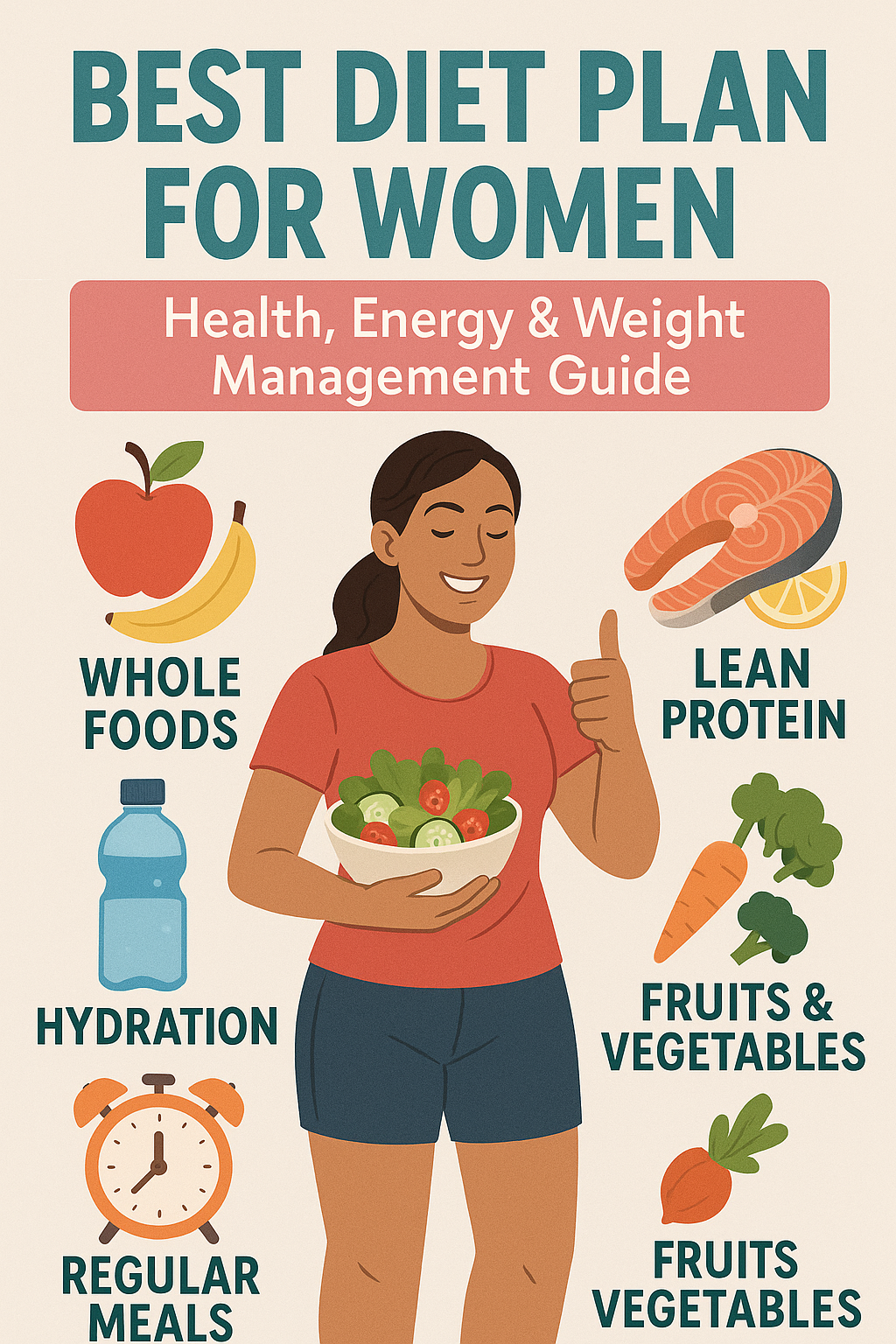Women’s nutritional needs change at various stages of life. Whether you’re navigating the teenage years, dealing with pregnancy, or experiencing the shifts brought on by menopause, understanding how to nourish your body at each phase is key to maintaining health, energy, and overall well-being. A well-balanced diet is essential not just for physical appearance, but for long-term health—ensuring you feel energized, resilient, and ready to take on the day. If you’re wondering how to structure the best diet plan for women, especially one that focuses on enhancing health, boosting metabolism, and balancing hormones, you’re in the right place. Let’s take a look at what makes a diet ideal for women, key nutrients to include, and how you can tailor your approach to your age, including tips for a diet plan for older woman after 40.
Why Tailoring Your Diet Matters for Women
There’s no one-size-fits-all approach to nutrition, especially when it comes to women. Women’s bodies go through unique biological changes—like puberty, pregnancy, and menopause—that affect everything from metabolism to hormone levels. That’s why a generic eating plan may not address these specific needs, leading to potential health issues like fatigue, weight gain, mood swings, or even chronic diseases down the road. The right diet plan not only supports your body’s needs but also helps you thrive at every age.
One important point to note is that women require more iron than men due to menstruation, which makes it vital to include iron-rich foods regularly. Additionally, as we age, calcium and vitamin D become increasingly crucial for maintaining strong bones. Folate, essential for women of childbearing age, and B12, which plays a role in energy production and cognitive health, are also key nutrients to prioritize. Ultimately, women’s nutrition should be customized to reflect these needs, ensuring you feel strong, balanced, and supported through every phase of life.
The Foundation of a Healthy Diet Plan for Women
When thinking about the best diet plan for women, it’s all about balance. A diet that focuses on whole, nutrient-dense foods without resorting to extreme restriction is the way to go. Too many diets today emphasize cutting out entire food groups or starving the body in order to lose weight. However, that’s not a sustainable or healthy approach. Instead, think of your diet as a way to nourish your body with the nutrients it needs to function at its best.
First and foremost, women need to fuel their bodies with complex carbohydrates, which provide the long-lasting energy that keeps us going throughout the day. Unlike simple carbs that are quickly absorbed, complex carbohydrates break down slower, giving you steady energy. Foods like brown rice, quinoa, sweet potatoes, and oats are fantastic sources of slow-releasing carbs. These foods help regulate blood sugar levels, making you feel fuller for longer and avoiding the dreaded energy crashes that are common with sugary snacks.
Next, let’s talk about lean protein. Protein is essential for maintaining and building muscle mass, repairing tissues, and keeping your metabolism in check. Since women typically have a higher fat percentage than men, it’s even more crucial to ensure that protein intake is sufficient to help maintain muscle strength. Excellent sources of lean protein include eggs, chicken breast, fish, and plant-based options like beans, legumes, and lentils. It’s especially important for women over 40 to focus on protein, as muscle mass naturally declines with age.
We can’t forget about healthy fats, which are vital for hormone production, brain function, and skin health. These fats also play a key role in reducing inflammation in the body. Avocados, nuts, seeds, olive oil, and fatty fish like salmon and mackerel are great choices to support overall health. While fats may have gotten a bad rap in the past, it’s clear that incorporating healthy fats into your diet promotes long-term wellness.
Fiber is another important component of a woman’s diet. It helps regulate digestion, aids in weight management, and keeps blood sugar levels stable. Fiber also plays a major role in gut health, which affects everything from immune function to mood. Vegetables like leafy greens, fruits like apples and berries, whole grains like quinoa, and seeds such as chia or flax are all excellent sources of fiber that should be included in your daily meals.
Finally, hydration is often overlooked but is crucial for overall well-being. Water helps with digestion, skin health, and energy production. Aim for 8-10 glasses of water a day, and consider including herbal teas or infused water for variety and additional health benefits.
Ideal Eating Schedule for Women
The way we eat is just as important as what we eat. Establishing a routine around mealtimes helps to keep your metabolism steady and supports overall health. A balanced eating schedule is key to ensuring that your body gets the nutrients it needs without unnecessary spikes in blood sugar or energy crashes.
For example, start your day with a nutrient-dense breakfast that includes protein, healthy fats, and complex carbs. A meal like Greek yogurt with oats, chia seeds, and berries provides a well-rounded mix of macronutrients to kick-start your metabolism and keep you feeling full.
Mid-morning, snack on something that contains a good balance of protein and fiber, like a boiled egg or a handful of nuts. This snack will sustain you until lunch, preventing the urge to reach for sugary or processed options. For lunch, opt for a dish that incorporates lean protein (chicken breast, tofu, or beans), whole grains (quinoa or brown rice), and plenty of veggies. Think of a colorful salad with grilled chicken, avocado, and roasted vegetables.
In the afternoon, try something simple like a piece of fruit with a handful of almonds or a small serving of hummus with carrot sticks. This keeps your blood sugar stable and provides a boost of energy to power through the second half of your day. Finally, for dinner, keep it light but balanced with a focus on lean protein, healthy fats, and lots of vegetables. Consider something like baked salmon with roasted Brussels sprouts or a vegetable stir-fry with tofu.
Special Considerations for Women Over 40
As women age, our bodies go through natural changes that impact everything from metabolism to hormone levels to bone health. In your 40s, you may start to notice that weight is harder to manage and that your energy levels aren’t what they once were. These changes are completely normal, but they do require an adjusted approach to your diet.
Hormonal shifts, particularly the decrease in estrogen levels as women approach menopause, can make it easier to gain weight, particularly around the midsection. Diet plan for older woman after 40 should prioritize weight management by focusing on nutrient-dense, whole foods that prevent spikes in blood sugar and stabilize energy levels.
For women over 40, protein becomes even more important. Muscle mass naturally decreases with age, and protein plays a critical role in preserving and building lean muscle. This is important not just for metabolism, but for maintaining strength and preventing injury. Aim for high-quality protein sources in every meal, such as lean meats, fish, eggs, and plant-based proteins like lentils and quinoa.
Additionally, don’t overlook the importance of calcium and vitamin D, both of which support bone health. Bone density begins to decline with age, making it vital to get sufficient amounts of these nutrients through food or supplements. Dairy products like yogurt and cheese, along with leafy greens and fortified plant-based milks, are excellent sources of calcium.
Lastly, consider including phytoestrogens in your diet. These plant compounds, found in foods like flaxseeds, soy, and chickpeas, can help balance estrogen levels naturally and alleviate some of the symptoms associated with menopause, such as hot flashes and mood swings.
Final Thoughts
When it comes to the best diet plan for women, there is no universal solution, but there are guiding principles that can help. It’s about nourishing your body with the right foods for your age and lifestyle. Whether you’re just starting your fitness journey or adjusting to the changes that come with being over 40, a balanced, nutrient-dense diet is the foundation for health, energy, and vitality. So, take charge of your nutrition, listen to your body, and embrace the changes that come with each stage of life. By doing so, you’ll feel your best—and be ready to take on anything life throws your way.




